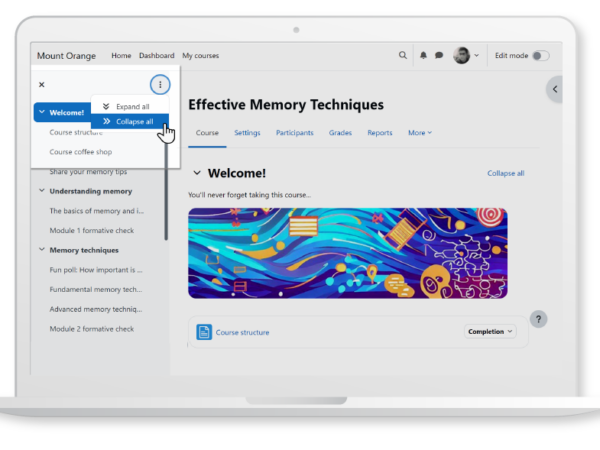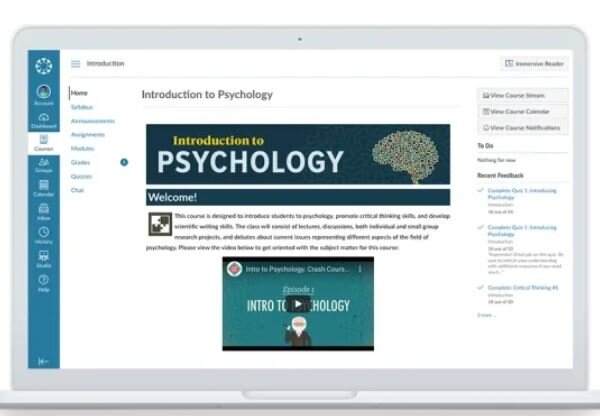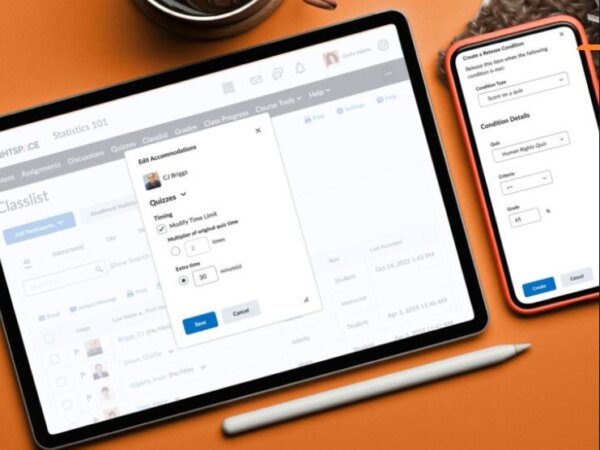As education and training undergo rapid transformation and continuous evolution, Learning Management Systems (LMS) have risen to paramount importance. These digital platforms have transformed how we learn and teach, bridging geographical gaps, streamlining content delivery, and providing valuable insights into the learning process.
The need for LMS solutions has grown exponentially in recent years, driven by various factors, including the rise of online education, the demand for workplace training, and the ever-expanding global learning community. To shed light on the significance of LMS in our contemporary world, let’s delve into some of the latest relevant statistics that underline their importance and impact:
- As per a recent report by Reports Insights, the Learning Management Systems (LMS) market is projected to reach over USD 69.69 Billion by 2030 with a CAGR of 19.2% during the forecast period (2023-2030).
- The use of technology in classrooms is increasing, with 48% of students using desktop computers, 42% using smartphones, 33% using interactive whiteboards, and 20% using tablet devices, according to a survey conducted by Cambridge International
- 90% of students prefer learning online to traditional learning methods.
- More than 41.7% of global Fortune 500 organizations utilize eLearning platforms to train their employees.
- Moodle, an open-source LMS, is used by over 396 million users in 239 countries and territories. This reflects the global nature of LMS adoption.
These statistics demonstrate the ever-growing significance of LMS solutions in modern education and training. As we explore LMS vendors in the upcoming section, we’ll delve deeper into the features, benefits, and challenges of these systems, providing you with a comprehensive understanding of their role in shaping the future of learning.
What are the benefits of an LMS?
Before diving into the specifics of each LMS platform, let’s briefly touch upon the advantages of using an LMS:
Centralized learning hub
LMS platforms provide a centralized location for storing and accessing learning materials, reducing the need for physical paperwork and manual tracking.
Flexibility and accessibility
Learners can access course content anywhere, anytime, promoting a flexible and accessible learning experience.
Scalability
LMS systems can accommodate a wide range of users, from small classrooms to large enterprises.
Analytics and reporting
Educators and administrators can track learner progress, identify areas for improvement, and make data-driven decisions.
Engagement and collaboration
LMS platforms often include tools for interactive discussions, quizzes, and assignments, fostering engagement and collaboration among learners and their teachers or instructors.
With all of these factors considered, here are the top 5 learning management systems in 2023.
#1 – Moodle LMS
Moodle is an excellent choice for a wide range of uses, including K-12 schools, universities, colleges, vocational training, government, public sector, nonprofits and a wide range of industries. Its adaptability makes it suitable for various teaching and training scenarios.
Top features
- Moodle’s open-source nature allows for extensive customization, making it adaptable to different learning needs.
- It offers a vast library of over 2,000 plugins and 13 Certified Integrations, allowing users to enhance functionality and tailor the LMS to their specific requirements.
- Learners can stay informed and engaged by delivering timely updates on course requirements and deadlines.
- Moodle goes beyond the basic content features of most learning platforms and is rich with activities that support good pedagogical practice and require learners to actively engage with the learning content and each other in a range of formats.
- Moodle provides detailed analytics and reporting features to track learner progress and make data-driven decisions.
- Powerful accessibility features make learning inclusive for individuals with diverse needs.
Moodle LMS pros
- As an open-source platform, it offers a budget-friendly solution for educational institutions.
- An active community who continuously contributes to its improvement and development.
- The platform takes a proactive approach to safeguarding user data and maintaining privacy standards.
- The extensive partner network ensures that organizations can access tailored solutions, expert guidance, and responsive assistance, regardless of their location.
- With over two decades of experience in the educational technology field, Moodle has honed its expertise and refined its platform to meet the evolving needs of educators and learners.
Moodle LMS cons
- Requires technical expertise for advanced customization.
#2 – Canvas LMS
Canvas LMS is designed to cater to a diverse audience, including K-12 schools, higher education institutions, and corporate training environments.
Top features
- Canvas offers an easy-to-navigate interface that promotes a seamless learning experience for educators and students.
- Mobile apps for iOS and Android, ensuring learners can access course materials and participate in discussions on the go.
- Educators can access detailed course analytics to gain student engagement and performance insights.
- It offers various third-party integrations, enhancing its functionality and compatibility with other tools.
Canvas LMS pros
- A user-friendly interface that simplifies the online learning experience.
- Seamless mobile accessibility, allowing learners to access their coursework and resources conveniently from smartphones and tablets.
- Robust analytics and reporting tools.
- An active and supportive user community.
Canvas LMS cons
- While Canvas offers a free version for educators, access to advanced features are limited and the full suite of features may come at a significant cost for institutions.
- Many reviewers cite a lack of customization options making it difficult to personalize their experience.
#3 – Blackboard learn
Blackboard Learn caters to a broad audience, making it suitable for various educational institutions, from primary and secondary schools to universities and professional training organizations.
Top features
- Blackboard Learn offers a robust content management system that allows educators to create, organize, and share course materials efficiently.
- It provides various assessment options, including quizzes, assignments, and rubrics, enabling educators to evaluate effectively and grade student performance.
- Blackboard Learn facilitates communication and collaboration through discussion boards, announcements, and messaging tools, fostering interaction among learners and instructors.
- It offers comprehensive analytics and reporting tools to track student progress and identify areas for improvement.
Blackboard Learn pros
- Extensive experience in the LMS market.
- Features catering to a wide range of educational needs.
- Support for content management and assessment.
- Collaboration and communication tools to enhance the learning experience.
Blackboard Learn cons
- Some users have found the interface less intuitive than other LMS platforms.
- Pricing can be a consideration, particularly for smaller institutions or organizations with limited budgets.
#4 – D2L Brightspace
D2L Brightspace is designed to cater to various educational institutions, from K-12 schools to higher education and corporate training environments.
Top features
- The platform employs data-driven insights to personalize learning experiences, helping educators tailor content to individual student needs.
- D2L Brightspace is committed to accessibility, ensuring all learners, including those with disabilities, can access and engage with course content.
- It supports ongoing assessment with tools for quizzes, assignments, and discussions, promoting formative assessment and timely feedback.
- The platform provides detailed analytics to help educators track learner performance and engagement, facilitating data-informed decision-making.
D2L Brightspace pros
- Emphasis on learner engagement and personalization.
- All learners, regardless of their abilities or disabilities, can access and engage with educational content.
- The mobile-responsive design allows learners to access their coursework on various devices.
- Robust analytics and insights with data-driven information about student performance and engagement.
- Collaboration and communication tools that facilitate interaction among students and educators.
D2L Brightspace cons
- Some users say that the interface can be improved.
- Pricing may vary, and smaller institutions or organizations with limited budgets may find it relatively expensive.
- Limited customization options.
#5 – TalentLMS
TalentLMS is a learning management system (LMS) that is suitable for corporate training environments.
Top features
- Trainers and learners find navigating easy, reducing the learning curve and ensuring a smooth onboarding process.
- Trainers can create, organize, and share course materials, multimedia content, documents, and quizzes.
- Various assessment options, such as quizzes, assignments, and surveys.
- Track learner progress and identify areas for improvement with analytics and reporting.
TalentLMS pros
- Accommodates both small organizations and large enterprises.
- Responsive and mobile-friendly, ensuring that learners can access content on various devices.
- Transparent pricing structure.
TalentLMS cons
- File upload limits on all plans.
- Customer support for lower-tiered plans is limited to email support.
- Lack of specialization for education.
- Customizing the interface is reported by users as not easy.
Which LMS is the best for your organization?
Selecting the right Learning Management System (LMS) is a decision that can significantly impact your teaching and training efforts. With numerous available options, making an informed choice that aligns with your needs is crucial.
Key reasons why hundreds of thousands of users trust Moodle LMS
Customizability: Moodle’s open-source nature means you can customize it to fit your organization’s unique requirements. Whether you’re a school, university, corporation, non-profit, or government organization, Moodle can be tailored to match your branding and offer the needed features.
Trusted Moodle partners: Access to an extensive network of Moodle Certified Partners and Service Providers offering a comprehensive range of services, including hosting, customization, learning design, and up to 24/7 support.
Community support: Moodle boasts an extensive and active user community. With a vast network of users and developers worldwide, you can access many resources, plugins, and solutions to any issues you may encounter.
Robust feature set: Moodle has a rich feature set, including tools for content management, quizzes, forums, and reporting. It allows you to create engaging and interactive learning experiences.
Scalability: Whether you’re managing a small classroom, a sprawling university, a global corporation, or a government department, Moodle effortlessly adapts to organizations of any size.
Security: Moodle’s dedication to data security, user privacy, and robust security controls is unwavering, thanks to its open-source nature. Achieve full control by deploying Moodle on a secure private cloud or choose from over 100 Certified Partners and Service Providers globally
Accessibility: Accessibility is a constant focus at Moodle, ensuring that software is accessible for everyone who uses it.
Mobile Learning: With its mobile-friendly interface and seamless cross-browser compatibility, Moodle content is readily accessible, even offline. Enjoy consistent performance across various web browsers and devices.
Integration capabilities: Moodle supports integration with over 2,000 open-source plugins, making it easy to connect with existing systems in your organization.
Analytics and Reporting: Moodle provides robust analytics and reporting features, enabling you to monitor learner progress and make informed decisions.
Moodle’s commitment to AI: Moodle is tapping into the power of AI via open-source plugins, with a strong focus on transparency, configurability, and future-proofing against evolving regulatory requirements in the education sector. The active Moodle community has been diligently creating a range of plugins, offering opportunities to experiment with incorporating generative AI into your Moodle platform in various ways.
Community of trust and 20+ years experience: With over 390 million users around the globe and translated into over 160 languages, more organizations choose Moodle products to support their education and training needs than any other system, which speaks volumes about its reliability and effectiveness in delivering quality education and training.
Conclusion
Choosing an LMS is a critical decision, and Moodle LMS has earned its reputation as a trusted solution for organizations of all sizes and types. Its customizability, cost-effectiveness, strong community support, and commitment to security and accessibility make it a compelling choice. Moodle LMS is worth considering if you’re looking for a platform that can evolve with your organization’s needs and provide a solid foundation for your teaching and training initiatives.








